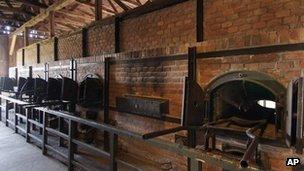'Holocaust ashes' painting: Poland opens investigation
- Published

The Nazis failed to destroy crematorium furnaces in the camp
Prosecutors in Poland have opened an investigation into reports that a Swedish artist used ashes from the Nazi death camp at Majdanek in a painting.
Carl Michael von Hausswolff's picture was hanging in a gallery in the Swedish city of Lund until protests caused the exhibition to close last month.
Von Hausswolff said he had collected the ashes from the crematorium at Majdanek during a visit in 1989.
The prosecutors said they had still no evidence a crime had been committed.
If the artist is charged with desecrating human ashes, he could face up to eight years in prison.
It is estimated the Nazis murdered 80,000 people at Majdanek, three-quarters of them Jews, during the German occupation of Poland in World War II.
Preserved ovens
Writing on the gallery's website, Von Hausswolff said the ashes had remained in a jar until two years ago, when he decided to mix them with water and create a painting as a reminder of the people tortured and killed in the camp.
However, the museum at Majdanek, in south-eastern Poland, strongly condemned his statement and asked prosecutors to investigate, saying it was sure the artist had not obtained the ashes legally.
When the Soviet army reached Majdanek in July 1944, they found much of it intact despite attempts by the Nazis to destroy the camp before retreating.
Consequently, it is one of the best-preserved sites of the Holocaust and the original ovens of its surviving crematorium can still be seen today.
Salomon Schulman, a key figure in Sweden's Jewish community, told Swedish television that Von Hausswolff's painting was "repulsive in the extreme", according to news website The Local.
Writing in the Sydsvenskan newspaper, Mr Schulman questioned whether it should be called art at all. "Who knows, some of the ashes might come from some of my relatives?" he added.
- Published6 December 2012
- Published19 May 2011